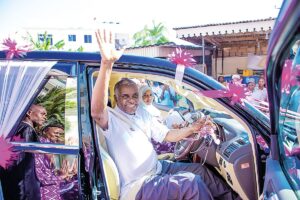Tanzania’s opposition leaders have recently been the target of government crackdowns against political dissent. A planned march in late September 2024 to protest against the abduction and murder of an opposition figure was stopped by the police, and its organisers were detained.
This renewed crackdown on opposition leaders dashes the promise of a more even political field conjured by the initially conciliatory tone taken by President Samia Suluhu.
Among those recently held by the police was Freeman Mbowe, the chairman of the country’s main opposition party, Chadema (Chama cha Demokrasia na Maendeleo). Mbowe has been the target of arrest and harassment by current and previous Tanzanian regimes.
Since taking over as chairman of the party in 2004, Mbowe has built a political machinery that threatens the supremacy of the ruling party, Chama Cha Mapinduzi. The ruling party, which grew out of the independence party Tanzania African National Union, has dominated politics in the east African nation since independence in 1961.
Tanzania amended its constitution in 1992 to allow for a multi-party system. However, it has not been possible for an opposition party to win the presidency. The constitutional changes were largely cosmetic and kept the ruling party in control of decision making in government and parliament. This has constricted the space for opposition.
Between the 1995 and 2015 general elections, however, there were gains in opposition parliamentary seats. In 1995, the first election after the constitutional amendments, 55 seats (23.7%) out of the available 232 went to opposition members of parliament. By 2015, out of 377 seats, 114 seats (30.2%) went to the opposition.
Read more: Tanzania is ruled with impunity – four key issues behind calls for constitutional reform
Over this period, different opposition parties took leading positions. Between 1995 and 2005, for instance, NCCR-Mageuzi and the Civic United Front were the dominant parties.
In 2005, Chadema fielded its first presidential candidate: 44-year-old Mbowe. Since then, Mbowe has spearheaded the party’s growth.
I have researched opposition politics in Tanzania for over a decade. In a recent paper, I traced how adaptive Mbowe has been in a changing environment. In my view, the ongoing clampdown is largely the price Chadema and its leadership are paying for posing a serious threat to the survival of an unpopular ruling party ahead of Tanzania’s presidential elections in 2025.
Mbowe’s chairmanship redefined Chadema’s growth strategy. He focused on party organisational building in terms of party structures, policies, agenda and branding; financing and sustainability; and ground operations and mobilisation.
The fruits of these efforts are evident. In the 2015 elections, Chadema’s presidential vote share increased to 40% from 6% in 2005.
Who is Freeman Mbowe?
Prior to entering party politics in 1992, Mbowe was a businessman. He also worked at the Central Bank of Tanzania.
His father, Aikaeli Mbowe, was a wealthy businessman who supported then president Julius Nyerere in the independence struggle. His father-in-law, Edwin Mtei, is the founder of Chadema and was the first governor of Tanzania’s central bank.
In his book, Mtei narrates how impressed he was with Mbowe’s ability to organise and campaign for the party in the 2005 elections. Scholars such as Dan Paget have published on the pragmatism and organising capabilities of Mbowe, and his role in strengthening Chadema’s organisation and financing capabilities.
As chairman, Mbowe led membership mobilising and party building operations between 2005 and 2010. His campaign in 2005 introduced the opposition party to citizens across the country through the use of helicopters – a first in Tanzania at the time.
The gains of this work were evident in the 2010 election results, where Chadema’s presidential vote share increased to 26%. The party fielded Wilbrod Slaa, a member of parliament, as its flagbearer.
With these results and the countrywide presence of Chadema, the party politics structure of Tanzania became a default two-party system. Chadema continued to establish its political presence and pushed for an anti-corruption agenda. Between 2010 and 2015, the party gained even more strength as a dominant opposition party.
In the 2015 elections, Chadema got 40% of the presidential vote with Edward Lowassa, a former prime minister under president Jakaya Kikwete, as its candidate. However, Mbowe faced criticism for this decision as Chadema had profiled Lowassa as one of the ruling party’s corrupt leaders.
There are a couple of explanations for Chadema’s high vote share in 2015. First, Lowassa had the resources to launch a broad campaign. Second, Chadema had put in a lot of groundwork between 2010 and 2015.
Tanzania’s political landscape
Arguably due to the results of the 2015 elections, Tanzania’s ruling party changed its strategy and the government took a more autocratic approach under President John Pombe Magufuli.
Under this regime, Tundu Lissu, Chadema’s vice chairperson, was shot multiple times. Mbowe was attacked and arrested. His assets and businesses were destroyed.
During the Magufuli administration, Chadema couldn’t organise using the traditional means of rallies. In June 2016, the president banned opposition rallies, ostensibly to prevent incidences of civil disobedience. Further, the government restricted public funding flows to Chadema.
Nevertheless, the party deployed other strategies to reach the masses, such as organising at the household level in an operation known as ChademaNiMsingi (Swahili for “Chadema is in its branches”) and Chadema Digital. These operations were systematically carried out in a restricted political space. The party’s “walking rallies” drew huge crowds.
Where to from here
Being a dominant opposition party with formidable strengths, Chadema is a constant target of the Chama Cha Mapinduzi government. The ruling party sees Mbowe as the force behind Chadema’s success as an organised opposition party. There have been state-sponsored calls against him being a party chairman for 19 years.
In 2021, her first year as president, Suluhu’s government arrested Mbowe and charged him with non-bailable terrorism charges. He stayed in jail for eight months. Surprisingly, after his release, Mbowe agreed to reconciliation talks with the president. This move led to criticism from within and outside Chadema.
Mbowe’s rationale was pragmatic: given the country’s political situation, Tanzania’s problems could only be addressed by engaging with the president.
Read more: Tanzania’s Hassan has made changes: but the ruling party retains a tight grip
Prior to these reconciliation talks, the political situation in the country was at a stalemate following the 2020 elections. They had been described by analysts and observers as the most rigged and violent ones Tanzania had ever had.
The reconciliation talks created the space for Chadema to reorganise and mobilise after Suluhu lifted the ban on rallies. However, with the rejuvenation of Chadema’s presence ahead of the forthcoming elections, Suluhu’s administration has gone into a repressive mode, clamping down against Mbowe and the party.
In this political context, Mbowe and Chadema’s leadership will need to persist in their push for political reform. This will require embracing creative ways to organise, mobilise and fundraise ahead of elections.
Aikande Clement Kwayu, Independent researcher & Lecturer, Tumaini University Makumira
Source: allafrica.com














